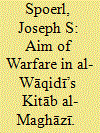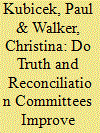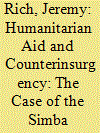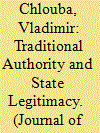| Srl | Item |
| 1 |
ID:
174416


|
|
|
|
|
| Summary/Abstract |
The Kitāb al-Maghāzī or “Book of the Raids” by the early Islamic historian Muḥammad b. ‘Umar al-Wāqidī (ca. 747–823) appeared for the first time in English translation in 2011. The editor and lead translator, Rizwi Faizer, asserts in her introduction (coauthored with Andrew Rippin) that “ … the primary theme that runs through al-Wāqidī’s Maghāzī is that Muḥammad’s battles were always defensive.” The present article shows that this is a misinterpretation of the text. According to the evidence supplied by al-Wāqidī, it is clear that Muḥammad’s military efforts were motivated by far more than mere self-defense. Warfare as Muḥammad practiced and preached it was missionary warfare. Its purpose was to stamp out polytheism, and, more broadly, to destroy a non-Islamic social and political order and to replace it with an Islamic one. The goal of this new order was, in turn, to induce conversion to Islam.
|
|
|
|
|
|
|
|
|
|
|
|
|
|
|
|
| 2 |
ID:
174420


|
|
|
|
|
| Summary/Abstract |
This article examines the impact of truth and reconciliation committees (TRCs) on human rights in Africa. It examines the effects of fifteen different TRCs from 1984–2014, and fills a gap in the existent literature by developing measures to assess the strength of each TRC. Many African TRCs are quite weak. Nevertheless, the study does not find that stronger TRCs are more successful in terms of human rights outcomes. While not dismissing the value of TRCs, this work discusses limitations of quantitative studies on their impact.
|
|
|
|
|
|
|
|
|
|
|
|
|
|
|
|
| 3 |
ID:
174419


|
|
|
|
|
| Summary/Abstract |
International efforts to reconstruct weak states after war have increased in recent years. These endeavors often focus on rebuilding militaries given the importance of strong and professional militaries in preventing conflict relapse. What explains variation in military-building outcomes in post-conflict states? The literature on statebuilding and security sector reform suggests a number of factors that are thought to ameliorate statebuilding dilemmas. This article identifies three central mechanisms from the literature and evaluates them using evidence from a case study of post-conflict army-building in Liberia. The findings show that the voluntary nature of cooperation matters strongly for the successful outcome in Liberia, as does donor identity, albeit differently than as predicted by theory. The role of local ownership receives somewhat weak support, however, which is surprising in light of its importance in the literature. These results have significant implications for theories of statebuilding and security assistance policies.
|
|
|
|
|
|
|
|
|
|
|
|
|
|
|
|
| 4 |
ID:
174417


|
|
|
|
|
| Summary/Abstract |
This article demonstrates how the U.S. and Congolese governments successfully used humanitarian aid in their counterinsurgency campaign against the rebel Conseil National de la Libération (CNL) in the Democratic Republic of Congo from 1964 to 1967. Washington orchestrated an effective military counteroffensive through the use of mercenaries and extensive logistical support. Though relief organizations claimed to be apolitical, they allowed Congolese and mercenary forces to use access to food and medical aid to entice rebels to surrender and to turn popular support away from the insurgents. The fighting created a major crisis, as famine took hold in rebel-held areas cut off from supplies. Although government abuses of civilians appalled Red Cross and Protestant aid personnel, they kept quiet about the army’s indiscriminate use of violence. One major reason for this willingness to partner with the Kinshasa government was the CNL, which treated humanitarian organizations as if they were mere tools of U.S. imperialism. Ultimately, the rebels bungled negotiations with the Red Cross over the fate of foreigners they held hostage in Stanleyville in 1964. These errors pushed humanitarian organizations further toward siding with the Congolese military. Moreover, Congolese military officers allowed humanitarian organizations to operate in only government-controlled territory.
|
|
|
|
|
|
|
|
|
|
|
|
|
|
|
|
| 5 |
ID:
174418


|
|
|
|
|
| Summary/Abstract |
Do African traditional leaders weaken state legitimacy at the local level? Past scholarship raises the possibility that unelected chiefs might undermine trust in national-level institutions. Relying on an original map of areas governed by chiefs and survey data from Namibia, this study examines whether respondents governed by traditional leaders are less likely to trust state institutions. The main finding is that compared to individuals not living under traditional authority, chiefdom residents are more likely to trust government institutions. Partially to alleviate the concern that chiefdom residence is endogenous to trust in national-level institutions, this article uses a genetic matching strategy to compare relatively similar individuals. A further finding is that the association between chiefdom residence and trust in state institutions is considerably weaker and less statistically significant for individuals who do not share ethnicity with their chief. This evidence suggests that traditional leaders’ ability to complement state institutions at the local level is compromised by ethnic diversity.
|
|
|
|
|
|
|
|
|
|
|
|
|
|
|
|